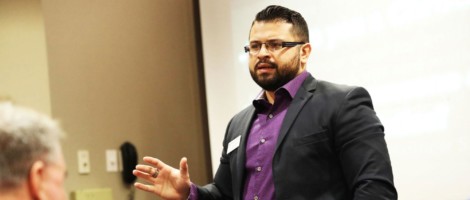“The biggest threat to Christianity is not atheism or strongholds or science,” Eric Hernandez, Texas Baptists Apologetics lead and millennial specialist said. “Quite frankly, the biggest threat to Christianity is intellectually Christians who refuse to rationally recognize and respond to the strongholds in their culture.”
Hernandez spoke to a packed house about the importance of apologetics in the church during his Tuesday morning workshop at the 2019 Annual Meeting.
“In my generation as a millennial and even in generations coming up, if you stand behind a pulpit and preach a sermon, by the end of that sermon they will Google 10 facts that you just said and say whether or not you were right or wrong,” Hernandez said. “It’s at their fingertips. We don’t want to try to hide or shelter them from these things, but rather show them how to respond.”
Apologetics is giving a defense of why we believe what we believe, and it is a biblical mandate for all Christians, he said, citing 1 Peter 3:15: “Always be ready to give a [logical] defense to anyone who asks you to account for the hope and confident assurance [elicited by faith] that is within you, yet [do it] with gentleness and respect.”
Hernandez explained that people often push back when he talks about the importance of apologetics, saying that they rely on the power of their personal testimony, or simply loving people like Jesus would.
“That’s certainly part of it, but that’s not all Jesus did,” he said. “If you tell me you’re a Christian because the Lord saved you from alcoholism or drugs or whatever, praise God for that, but if I were a nonbeliever and I said, ‘I’ve never had that experience; that’s great that you did, but I haven’t experienced it. So while that may answer why you are a Christian, it doesn’t answer why I should be a Christian.’”
Hernandez outlined three main strongholds in our culture that can be addressed through thorough sound apologetics: relativism, scientism and naturalism.
Relativism argues that absolute truth does not exist. More than one thing could be true, depending on how you look at an issue. Hernandez pointed out that if there is no truth, then relativism itself cannot be true. It is a self-defeating philosophy.
Scientism says that the only way to gain knowledge is through science. If something cannot be known scientifically, then it cannot be known or it is not true. Hernandez said that science is a wonderful tool for studying the physical world, but God, by definition, is an incorporeal spiritual being.
“You cannot use something that only investigates the physical to study something non-physical,” he said. “It’s a category fallacy.”
Finally, naturalism claims that the physical world of time, space and matter is all that exists, therefore God cannot exist. Hernandez explained that naturalism can be refuted by the three parts of the Kalām cosmological argument: Everything that begins to exist has a cause. The universe began to exist. Therefore, the universe has a cause.
Causes precede their effects, so the cause of the universe must exist before and outside the universe, Hernandez said. The universe’s cause must be timeless, spaceless, immaterial, supernatural and unimaginably powerful to create something out of nothing. In other words, the cause of the universe must be God.
Hernandez urged the church to prepare its young people with answers for the reasons for their faith.
For more information, contact Eric Hernandez at eric.hernandez@txb.orgorvisit txb.org/evangelism.
Texas Baptists is a movement of God’s people to share Christ and show love by strengthening churches and ministers, engaging culture and connecting the nations to Jesus.
The ministry of the convention is made possible by giving through the Texas Baptists Cooperative Program, Mary Hill Davis Offering® for Texas Missions, Texas Baptists Worldwide and Texas Baptist Missions Foundation. Thank you for your faithful and generous support.
Subscribe to receive stories like this one directly to your inbox.
We are more together.
Read more articles in: Annual Meeting, Great Commission
More from Lauren Sturdy
- David Hardage highlights Texas Baptist accomplishments in ministry in Executive Director report
- President Jason Burden calls Texas Baptists to daily faithfulness
- Cultural change and pandemic decisions will impact churches for generations, says Ed Stetzer
- Texas Baptists encouraged to embrace unity and make disciples
- 2021 African American Rally attendees urged to have vision beyond what they see
